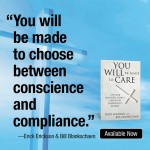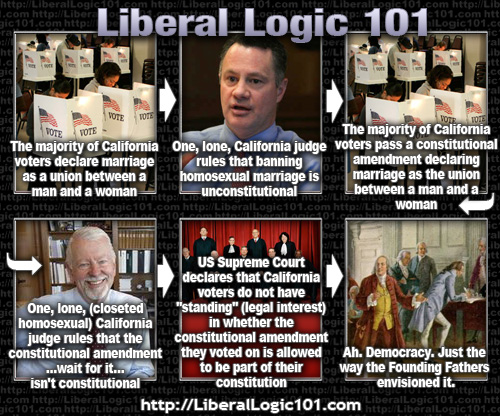In June of 2013, the Supreme Court’s liberals declared that the Defense of Marriage Act, which was passed by Congress and signed by President Bill Clinton, was unconstitutional, because, as they said, the power of the individual state in defining marriage is “of central relevance", and the decision to grant same-sex couples the right to marry is "of immense import." Basically, it’s the state, and not the federal government, which should determine what marriage is and license accordingly.
Two years to the day later, those same liberals overrode those immensely important marriage laws in 14 states and proclaimed same-sex marriage from the federal bench. And it once again proves something I’ve said on this podcast so many times; for the Left, it is all about politics. Constitutional matters, federalism, and some supposed regard for the rule of law, all of it, take a back seat in order to get their political agenda passed. The individual state’s ability to define what marriage is, is of central relevance, right up until it isn’t.
Chief Justice John Roberts, in his dissent, noted this, "This court is not a legislature. Whether same-sex marriage is a good idea should be of no concern to us.” Right, that’s what states were allowed to determine on their own, and in fact it was going that way with, as I said, only 14 states left holding on to traditional marriage.
I will say, as an aside, that this thought by Roberts – that the court is not a legislature – was rather ironic, given his previous rewriting of ObamaCare. It’s like two, two, two Supreme Court chief justices in one!
Let me ask you this; which would have been better? Should the Court have allowed same-sex marriage to work its way through the culture, gaining support as it had been doing, or do what it did and just impose it by judicial fiat? Before you answer, consider how well that worked for abortion. It is still a hard fought battle in the culture, and in the state legislatures as well. Rather than let it organically happen democratically, abortion was imposed, and the backlash has been with us ever since. I oppose abortion, and I also oppose a government that will override me and my state’s rights to govern ourselves. I oppose same-sex marriage, but again, the Court’s liberals (and if I may, it seems that liberals in general) have no problem holding state law immensely important one day, and the next day overruling them, so long as their political agenda is served. As I mentioned in the previous episode, the process is just as important as the outcome, and the process, both here and with the ObamaCare ruling, are deeply flawed and set a bad precedent for future courts to reinterpret words, and override the will of the people.
There have been many predictions about what comes next. Some, on the pages of TIME magazine, are already pushing polygamy. That effort has been going on for years, but it got a boost with this ruling. There are those already calling for the abolishing of tax exempt status for religious institutions – churches and religious schools – that won’t teach the liberal orthodoxy about same-sex marriage or won’t perform them. These are likely coming down the road. But, as Erick Erickson noted, the first thing to come will be … silence. The day of the ruling, a newspaper in Pennsylvania said they wouldn’t print letters to the editor on the topic anymore. I have a friend who, when asked what the Bible says about homosexuality, gave a straight answer (so to speak) and was immediately pounced on for being bigoted and hateful. You don’t have to thump anyone with a Bible anymore; it just has to be in the room for someone to claim you’re evil.
So silence will fall, but just because you don’t hear a particular opinion anymore doesn’t mean it’s not there. However, if a baker or a photographer can be put out of business for not participating in a same-sex wedding, how much more of a target are those churches that won’t perform them for what 5 justices have now deemed is a “fundamental right”?
With the ObamaCare and the same-sex marriage rulings, the court has done two things. It has taken power away from you at both the federal and state level.
If you ever complained that Washington, DC was unresponsive to the needs of the people, the ObamaCare ruling should bother you, at the very least. That is, unless you’re celebrating the topic of the ruling, then the process is likely nothing you’re concerned about. I’ve seen it in my Facebook feed. However, from this day forward, federal agencies like the IRS, and all the way up to the President, don’t have to restrain themselves to the actual wording of the laws Congress passes. ObamaCare said you got subsidies through exchanges established by the states, but an unelected federal agency changed that. Your representatives, and by extension you, have lost more influence. The government can do what it wants.
And if you ever complained that your state government was unresponsive to the needs of the people, the same-sex marriage ruling should bother you, too. But again, the winners are too busy celebrating to see how this, too, has erased their influence and yours at the state level. It just takes 5 Supreme Court justices to invalidate anything a state does. Vote however you want, call your state representative as much as you want, but in the end, a majority of 9 unelected justices get the final say for over 320 million people. One man, one vote, indeed.
If you celebrate these rulings, and if you’ve ever been a proponent of power to the people, or you’ve ever put forth the idea that every vote should count, you either have not been paying attention, or have no idea at all what those phrases even mean. At least, I’d really hope that this can all be explained by ignorance and apathy, because the alternative is worse; willful misuse of the founding principles of this country, and that will bring us down faster than any law you can pass.
The Left loves the platitude “Government is just another name for the things we choose to do together.” Of course, by the phrase “choose to do together”, they mean “use a panel of 9 lawyers to force everyone to do what they want”. Platitudes are useful in the meantime, but in the end, for the Left, it’s all about politics.

